Mary Anne Yarde's Blog: The Coffee Pot Book Club , page 223
June 17, 2016
Dreams and Disasters in 17th Century #Ireland @nancy_blanton
⚔ Ireland ⚔

Rife with conflict, disaster, invention and sweeping change, there is not a century in history more fascinating and remarkable than the 17th.
In the words of J.P. Sommerville, University of Wisconsin history professor, the 17th century is…
“probably the most important century in the making of the modern world. It was during the 1600s that Galileo and Newton founded modern science; that Descartes began modern philosophy; that Hugo Grotius initiated international law; and that Thomas Hobbes and John Locke started modern political theory.”
At the same time, the century produced an unprecedented synergy of disaster, as described by Robert Burton in 1638:
“War, plagues, fires, inundations, thefts, murders, massacres, meteors, spectrums, prodigies, apparitions…and such like, which these tempestuous times affoord…”
And all of that during the first few decades.
Some historians believe the changes and difficulties of this century resulted in part from a global climate change. The “Little Ice Age,” extending from the 16th to 19th centuries, delivered a particularly cold interval in the mid-17th century.
England in the 1630s recorded great floods, widespread harvest failure, intense cold winters, wet and cold springs, and drought in summer so excessive that “the land and trees are despoiled of their verdure, as if it were a most severe winter.” Such conditions would have been seen in Ireland as well.
These natural forces so affected human activity as to upset the existing social, economic and political equilibrium. People facing cold, famine, and grave uncertainty are likely to behave in more desperate manner.
Ireland in particular faced considerable unrest as the lands, traditional clans and centuries-old way of life were forever altered.
Life in Ireland
In 1603, Queen Elizabeth I died, leaving her throne and kingdom to James I. Her military forces in Ireland had delivered a crushing blow to end the Desmond rebellion in the southwest province of Munster.
The Desmond’s stronghold ~ Carrigafoyle Castlearians~ was taken by the English forces in 1580. The English saw Ireland as underutilized and ripe for exploitation. They sought to improve on Irish farming methods by settling their own more efficient farmers, and thereby increasing crown revenues.

The Earl of Desmond was among the Irish gentry who held castles, manor houses and vast tracts of land. They were mostly of Norman or Saxon roots, descending from distinguished families or clans who had obtained grants from Henry II in the 12th century. They resented the crown’s efforts to take control of their long-held dominions and displace their Irish tenants: typically subsistence farmers who paid rents either in food or in coin from the goods they sold. Often these tenants lived in one-room houses constructed of mud and grass, with no windows and a single door that served as both the entry and chimney.
Lord Deputy Arthur Grey seemed to defeat Queen Elizabeth’s purpose with his cruelty and scorched earth tactics. He left the province devastated, little more than a wasteland that would require years to recover, and was later removed from his position for excessive brutality—but, he had cleared the way once and for all for English settlement.
In a land already compromised by drought, the remaining Irish faced terrible famine, plague, disease, homelessness and oppression. Lands that had been owned and passed down through generations by traditional clans, especially Irish Catholic, were confiscated and granted to English military officers as reward for their service. Survival for the Irish was tenuous and choices were few. Some restoration took place in the coming years, but a fury simmered below the obedient surface.
In 1625, Charles I succeeded his father and extended his policies, filling his treasury through increased taxation and monopolies to his favorites, and expanding plantation in Ulster. When civil war erupted in England, Irish clans welcomed the distraction. They organized and rebelled again, retaking confiscated lands and ousting the English settlers, often violently.
King Charles I
When Parliament was victorious in the civil war, it took control of England and all of its business, and shocked the monarchies of the world by executing King Charles in 1649.
Parliamentary army leader Oliver Cromwell now turned his attention to Ireland, cutting an unrelenting swath of brutality, destruction and death across the island. Towns were leveled, people massacred, and terror wrought with full force. One estimate claims 618,000 Irish deaths from fighting or disease—an astounding 41 percent of the pre-war population.
Oliver Cromwell
Surviving Irish were relocated to rocky hills that served better for grazing sheep than growing crops. Some joined armies and fought in foreign wars; some became pirates. Some were sent to workhouses where they likely died; some escaped to colonies in America. Cromwell deported many to the West Indies where they perished from slave labor and tropical disease.

Irish Catholics were forced out of the Irish Parliament, while Catholic Mass and the Irish language were outlawed. Catholics were banned from holding office, Catholic clergy were expelled from the country, and Catholic landowners were stripped of their properties. An estimated one-third of the Irish-Catholic population was killed or deported.

On the heels of this work, Cromwell was elevated to “Lord Protector,” England’s uncrowned king, and he established his famed Commonwealth. Oppression of Ireland was severe and would be seen by historians as genocide. But by the time of Cromwell’s death in 1658, England had tired of his Puritan influences, and his son proved a weak successor. Charles II was brought back from his exile in France and monarchy was restored.
While somewhat kinder and more tolerant toward the Irish who had supported his return, including the Earl of Ormonde who had led the royalists in Irish Confederacy, the plantation of Ireland continued. Known as the Merry Monarch, Charles II restored some of the gaiety that had been lost to England, and smoothed the way for new thought, invention and discovery in the latter part of the century as the Age of Enlightenment was dawning.
King Charles II
(Geoffrey Parker’s Global Crisis was a valuable source for this post)
About the author

Nancy Blanton is the author of novels based primarily in Irish history.
The Prince of Glencurragh, her second novel, is set in 1634 prior to the great rebellion of 1641.

Her first novel, Sharavogue, won first place for historical fiction in Florida’s Royal Palm Literary Awards. Both books are available on amazon.comand barnesandnoble.com. Visit her at nancyblanton.com.
Published on June 17, 2016 00:00
June 15, 2016
Guest Post - Author's Inspirations, David Meredith @DMeredith2013
David Meredith, is not stranger to this blog. Earlier on in the year David wrote a fantastic post about Fairy Tales- you can check it out here! Today, he is here to talk about about his inspirations behind his latest book, The Reflections of Queen Snow White.
Let's take a look at the book.

What happens when "happily ever after" has come and gone?
On the eve of her only daughter, Princess Raven's wedding, an aging Snow White finds it impossible to share in the joyous spirit of the occasion. The ceremony itself promises to be the most glamorous social event of the decade. Snow White’s castle has been meticulously scrubbed, polished and opulently decorated for the celebration. It is already nearly bursting with jubilant guests and merry well-wishers. Prince Edel, Raven's fiancé, is a fine man from a neighboring kingdom and Snow White's own domain is prosperous and at peace. Things could not be better, in fact, except for one thing:The king is dead.
The queen has been in a moribund state of hopeless depression for over a year with no end in sight. It is only when, in a fit of bitter despair, she seeks solitude in the vastness of her own sprawling castle and climbs a long disused and forgotten tower stair that she comes face to face with herself in the very same magic mirror used by her stepmother of old.
It promises her respite in its shimmering depths, but can Snow White trust a device that was so precious to a woman who sought to cause her such irreparable harm? Can she confront the demons of her own difficult past to discover a better future for herself and her family? And finally, can she release her soul-crushing grief and suffocating loneliness to once again discover what "happily ever after" really means?
Only time will tell as she wrestles with her past and is forced to confront The Reflections of Queen Snow White.(Disclaimer: contains some violence and sexual content)
***
The Macabre Origins of Faerie Tales and The Reflections of Queen Snow White
Once upon a time and happily ever after – these words are synonymous with the faerie tale genre. Just you name it – Snow White, Cinderella, Sleeping Beauty, The Little Mermaid – the version of these tales with which most of us are familiar all begin and end with these two phrases, and neatly encapsulate everything that they imply. The poor princess faces adversity. Then the handsome prince swoops in to save the day. They find love and life remains blissful ever after… at least in the Disney-variety retellings, that is…However, most faerie tales in their original forms were not nearly so benign nor obviously the quintessential juvenile literary fare that we assume them to be these days. Most were dark, violent, and decidedly adult. It is this darkness that I have sought to capture and reintroduce in The Reflections of Queen Snow White, but let me take a moment to illustrate my point.1. In the original version of Little Red Riding Hood there is no Woodsman and Grandma does not make an appearance. Rather the wolf simply tricks Red into going the wrong way in the forest, kills her, and eats her… The end. 2. Similarly, in the original version of Goldilocks and the Three Bears, the bears find Goldie in Baby Bear’s bed and summarily rip her to pieces.3. In the original Cinderella, she did in fact have animal friends, only these didn’t sew her a dress. Instead, the pigeons notice copious amounts of blood gushing from the glass slipper as the evil step sisters try it on (having previously cut off half their foot to make it fit) warned the prince, and pecked afore mentioned step-sisters’ eyes out leaving them lame, blind beggars for the rest of their lives.4. In the original Little Mermaid, the little mermaid character is convinced by her sisters to stab the prince to death in his sleep on his wedding night when he falls in love with and marries someone else and then dribble his blood over her feet to turn them back into a tale. (She chooses to die herself instead at the last minute and turns into sea foam).5. In the original version of Sleeping Beauty, the handsome prince does not wake her with a sweet kiss. Instead, he rapes her while she’s asleep, gets her pregnant (twice) and it is only when those children reach toddler age and one of them sucks on his mother’s finger (removing the magic splinter that caused the sleeping spell in the first place) that she awakens. She quickly discovers that the prince is in fact married already, but don’t worry! His wife is actually an “evil ogress” so it’s okay when they conspire to murder her. ThenSleeping Beauty lives happily ever after… married to her homicidal, rapist husband.Originally, faerie tales were stories of folk wisdom and morality intended for adults, but because they were also popular with children many elements (especially overtly sexual aspects) were cut out - (for example in the original version of Rapunzel, the witch discovers about the prince’s visits by asking Rapunzel why her clothes look so tight - implying that she is pregnant). Furthermore, major revisions were made to the literary versions which have survived (as opposed to those of the oral tradition which have largely faded) to make them more kid-friendly (although it should be noted that a lot of earlier revisions, like the Victorian Grimm rewrite for example, actually made the stories more violent, especially when punishing the villain). I have taken The Reflections of Queen Snow White back to those original adult origins to tell what is essentially a very human story about overcoming a childhood of abuse and neglect, coping with grief, and finding purpose again when “happily ever after” ends, as invariably it must for any who inhabit this mortal coil called existence. My take on the story attempts to see Snow White as a real and very complex human being who must surely have had some serious emotional trauma and psychological baggage after everything she had gone through. One of the things I like best about faerie tales is that in spite of magic mirrors, glass shoes, and auric fiber-producing textile equipment, they are at their core intrinsically true. They are a stark distillation of human nature in all of its nobility and all of its malignity. They continue to persist in popularity expressly because the stark humanness of the characters and situations described therein touches something deep within us instilling an affection that borders on the primal. It is precisely these feelings of empathetic humanity that I have tried to tap into with The Reflections of Queen Snow White, and portray her as a battered woman of flesh and blood, rather than the saccharine sweet cartoon epitome of purity and beauty that popular media has reduced her to, who overcomes great tragedy and pain to build a life of joy and meaning for herself. I hope you all pick up a copy and enjoy!
Where can I buy this fabulous book?Amazon.com
About the author. David Meredith is a writer and educator originally from Knoxville, Tennessee. He recieved both a Bachelor of Arts and a Master of Arts from East Tennessee State University, in Johnson City, Tennessee as well as a Tennessee State Teaching license. On and off, he spent nearly a decade, from 1999-2010 teaching English in Northern Japan, but currently lives with his wife and three children in the Nashville Area where he continues to write, teach English, and is pursuing his doctoral degree in educational leadership. Useful links.Author Amazon Page Goodreads FacebookTwitter
David Meredith is a writer and educator originally from Knoxville, Tennessee. He recieved both a Bachelor of Arts and a Master of Arts from East Tennessee State University, in Johnson City, Tennessee as well as a Tennessee State Teaching license. On and off, he spent nearly a decade, from 1999-2010 teaching English in Northern Japan, but currently lives with his wife and three children in the Nashville Area where he continues to write, teach English, and is pursuing his doctoral degree in educational leadership. Useful links.Author Amazon Page Goodreads FacebookTwitter
Let's take a look at the book.

What happens when "happily ever after" has come and gone?
On the eve of her only daughter, Princess Raven's wedding, an aging Snow White finds it impossible to share in the joyous spirit of the occasion. The ceremony itself promises to be the most glamorous social event of the decade. Snow White’s castle has been meticulously scrubbed, polished and opulently decorated for the celebration. It is already nearly bursting with jubilant guests and merry well-wishers. Prince Edel, Raven's fiancé, is a fine man from a neighboring kingdom and Snow White's own domain is prosperous and at peace. Things could not be better, in fact, except for one thing:The king is dead.
The queen has been in a moribund state of hopeless depression for over a year with no end in sight. It is only when, in a fit of bitter despair, she seeks solitude in the vastness of her own sprawling castle and climbs a long disused and forgotten tower stair that she comes face to face with herself in the very same magic mirror used by her stepmother of old.
It promises her respite in its shimmering depths, but can Snow White trust a device that was so precious to a woman who sought to cause her such irreparable harm? Can she confront the demons of her own difficult past to discover a better future for herself and her family? And finally, can she release her soul-crushing grief and suffocating loneliness to once again discover what "happily ever after" really means?
Only time will tell as she wrestles with her past and is forced to confront The Reflections of Queen Snow White.(Disclaimer: contains some violence and sexual content)
***
The Macabre Origins of Faerie Tales and The Reflections of Queen Snow White
Once upon a time and happily ever after – these words are synonymous with the faerie tale genre. Just you name it – Snow White, Cinderella, Sleeping Beauty, The Little Mermaid – the version of these tales with which most of us are familiar all begin and end with these two phrases, and neatly encapsulate everything that they imply. The poor princess faces adversity. Then the handsome prince swoops in to save the day. They find love and life remains blissful ever after… at least in the Disney-variety retellings, that is…However, most faerie tales in their original forms were not nearly so benign nor obviously the quintessential juvenile literary fare that we assume them to be these days. Most were dark, violent, and decidedly adult. It is this darkness that I have sought to capture and reintroduce in The Reflections of Queen Snow White, but let me take a moment to illustrate my point.1. In the original version of Little Red Riding Hood there is no Woodsman and Grandma does not make an appearance. Rather the wolf simply tricks Red into going the wrong way in the forest, kills her, and eats her… The end. 2. Similarly, in the original version of Goldilocks and the Three Bears, the bears find Goldie in Baby Bear’s bed and summarily rip her to pieces.3. In the original Cinderella, she did in fact have animal friends, only these didn’t sew her a dress. Instead, the pigeons notice copious amounts of blood gushing from the glass slipper as the evil step sisters try it on (having previously cut off half their foot to make it fit) warned the prince, and pecked afore mentioned step-sisters’ eyes out leaving them lame, blind beggars for the rest of their lives.4. In the original Little Mermaid, the little mermaid character is convinced by her sisters to stab the prince to death in his sleep on his wedding night when he falls in love with and marries someone else and then dribble his blood over her feet to turn them back into a tale. (She chooses to die herself instead at the last minute and turns into sea foam).5. In the original version of Sleeping Beauty, the handsome prince does not wake her with a sweet kiss. Instead, he rapes her while she’s asleep, gets her pregnant (twice) and it is only when those children reach toddler age and one of them sucks on his mother’s finger (removing the magic splinter that caused the sleeping spell in the first place) that she awakens. She quickly discovers that the prince is in fact married already, but don’t worry! His wife is actually an “evil ogress” so it’s okay when they conspire to murder her. ThenSleeping Beauty lives happily ever after… married to her homicidal, rapist husband.Originally, faerie tales were stories of folk wisdom and morality intended for adults, but because they were also popular with children many elements (especially overtly sexual aspects) were cut out - (for example in the original version of Rapunzel, the witch discovers about the prince’s visits by asking Rapunzel why her clothes look so tight - implying that she is pregnant). Furthermore, major revisions were made to the literary versions which have survived (as opposed to those of the oral tradition which have largely faded) to make them more kid-friendly (although it should be noted that a lot of earlier revisions, like the Victorian Grimm rewrite for example, actually made the stories more violent, especially when punishing the villain). I have taken The Reflections of Queen Snow White back to those original adult origins to tell what is essentially a very human story about overcoming a childhood of abuse and neglect, coping with grief, and finding purpose again when “happily ever after” ends, as invariably it must for any who inhabit this mortal coil called existence. My take on the story attempts to see Snow White as a real and very complex human being who must surely have had some serious emotional trauma and psychological baggage after everything she had gone through. One of the things I like best about faerie tales is that in spite of magic mirrors, glass shoes, and auric fiber-producing textile equipment, they are at their core intrinsically true. They are a stark distillation of human nature in all of its nobility and all of its malignity. They continue to persist in popularity expressly because the stark humanness of the characters and situations described therein touches something deep within us instilling an affection that borders on the primal. It is precisely these feelings of empathetic humanity that I have tried to tap into with The Reflections of Queen Snow White, and portray her as a battered woman of flesh and blood, rather than the saccharine sweet cartoon epitome of purity and beauty that popular media has reduced her to, who overcomes great tragedy and pain to build a life of joy and meaning for herself. I hope you all pick up a copy and enjoy!
Where can I buy this fabulous book?Amazon.com
About the author.
 David Meredith is a writer and educator originally from Knoxville, Tennessee. He recieved both a Bachelor of Arts and a Master of Arts from East Tennessee State University, in Johnson City, Tennessee as well as a Tennessee State Teaching license. On and off, he spent nearly a decade, from 1999-2010 teaching English in Northern Japan, but currently lives with his wife and three children in the Nashville Area where he continues to write, teach English, and is pursuing his doctoral degree in educational leadership. Useful links.Author Amazon Page Goodreads FacebookTwitter
David Meredith is a writer and educator originally from Knoxville, Tennessee. He recieved both a Bachelor of Arts and a Master of Arts from East Tennessee State University, in Johnson City, Tennessee as well as a Tennessee State Teaching license. On and off, he spent nearly a decade, from 1999-2010 teaching English in Northern Japan, but currently lives with his wife and three children in the Nashville Area where he continues to write, teach English, and is pursuing his doctoral degree in educational leadership. Useful links.Author Amazon Page Goodreads FacebookTwitter
Published on June 15, 2016 00:00
June 14, 2016
Bede’s Ecclesiastical History Of the English People #amreading
I have been re-reading Bede’s Ecclesiastical History Of the English People ~ it gives me a bit of a break from proof-reading book 2 of The Du Lac Chronicles. And I thought I would share my favourite passage with you.
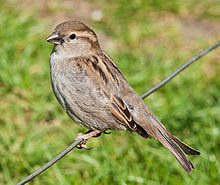 “The present life of man upon earth, O King, seems to me, in
“The present life of man upon earth, O King, seems to me, incomparison to that time which is unknown to us, like the swift flight of a sparrow through the room where you sit at supper in winter, with your commanders and ministers, with a good fire in the midst, while the storms of rain and snow rage outside. The sparrow, I say, flying in at one door, and immediately out at another, while he is inside, is safe from the wintery storm; but after a short space of shelter, he immediately vanishes out of sight, into the dark winter from which he emerged. So this life of man appears for a short space, but of what went before, or what is to follow, we are utterly ignorant.”
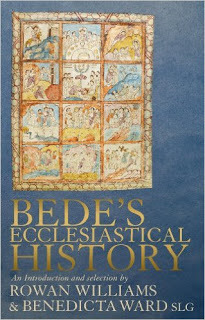 I think that is the real challenge of any historical fiction writer ~ we can only hazard a guess of what life must have been like back then. We cannot truly understand it, because we were not there. Still, we all do our best.
I think that is the real challenge of any historical fiction writer ~ we can only hazard a guess of what life must have been like back then. We cannot truly understand it, because we were not there. Still, we all do our best.If you have never read the works of Bede before, then I strongly recommend that you do. Maybe, just for a moment, you can be that sparrow and fly through his world.
Amazon
Published on June 14, 2016 00:00
June 13, 2016
Book Review ~ Dragon Knight's Shield @m_morganauthor
Dragon Knight’s ShieldMary’s Morgan
“Is he always so exasperating?”
Angus could not fathom what she meant by the word, nor did he care.
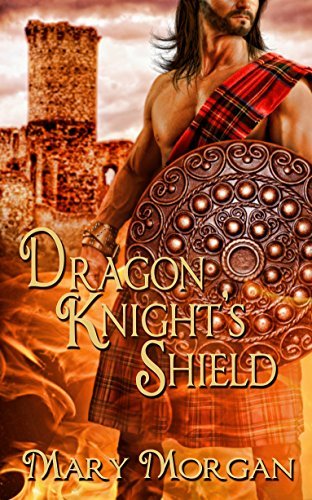
Angus MacKay, leader of the Dragon Knights, failed his brothers and his clan upon the death of his sister. Now he must fight the darkness of despair tempting his soul. Back on Scottish soil, he comes face to face with Deirdre who can wield a sword as mightily as his warriors, and he takes her captive. Yet, with each passing day, the fire dragon inside him roars to claim the one woman fate has destined for him. Famed mystery writer, Deirdre Flanagan, is unprepared for the next chapter in her life. On a vacation to Scotland, she steps through the mists and enters into a skirmish alongside a Highlander. However, the fight has only begun, and now she must battle Angus as well as evil in order to claim the love of this Dragon Knight. Will their love be powerful enough to shield them from danger, or burn them to ashes?
What did I think of the book?
“They were an ancient order, descended from the great Tuatha Dé Danann, the Sidhe, or in simpler terms: the Fae. Half-human and half-fae, each was blessed with mystical powers. Given to them were holy relics from the Fae and guardianship over their dragons.”
It's hard being the first-born son. It is even more difficult when you are a Dragon Knight. Angus Mackay has failed his brothers, the Clan and his sister. He is racked with grief and guilt from his sisters death. He takes himself away from his beloved Scotland and makes his living travelling from one tournament to the next, but dark forces are plotting against him and his people. He has to put aside his guilt and seek redemption from the Fae.
Deirdre Flanagan has the greatest friends. For her thirty birthday, her friends present her with a voucher for a holiday in Scotland. If only she knew just where such a journey would take her.
Wow! What an adventure Mary Morgan has just taken me on. From modern day America to the ruggedness of Scotland in the Middle Ages, this book had it all. Romance. Betrayal. Guilt. Love. Hate. Fear. Redemption. And let’s not forget - time-travel!
Calling it a page-turner does not give this book enough credit. Once I started reading this book, I could not put it down. I stayed up until the early hours of the morning so that I could finish it – it is that kind of book.
Just to make things clear this is book 4 of a series, now I have not read the other books, and I was a little bit concerned before I started it that I wouldn't be able to pick up the story, but that wasn’t the case at all. Morgan didn’t go into vast amounts of detail retelling a story already told, but I felt she gives just the right information, to make the backstory clear, so I had a sense of what had come before.
I liked Deirdre. She goes from mystery writer to a warrior princess – thank goodness for all those martial art lessons back in America! She is incredibly brave, and although she is initially shocked at being transported to a different time - and for a while she thinks it is all some elaborate re-enactment group that she has stumbled upon - she rises to the occasion and seems to make an unconscious decision to make the best of it. Likewise, Angus stole my heart. His guilt was so heartrending that I cried when I was reading about what had happened to him. He is this amazing warrior who tries to do what is right for his brothers and his Clan, but it didn’t work out the way he had hoped, and he really punishes himself for that. His journey to redemption is incredibly difficult, but so worth the read.
Lachlan is the perfect antagonist – he is a frightfully evil, power-obsessed, lunatic. I hated him – just thinking about him makes my skin crawl. I am going to stop thinking about him now!! (Shivers)
Morgan’s attention to detail has to be commended. She brought 13th Century Scotland back to life. From the harshness of the Highlands to the intrigue and danger at court, it was a vivid picture and historically very accurate.
If you love history, time-travel, romance and a great plot – then the Dragon Knight Series are the books for you. I am definitively going to be losing myself in this world again. I can’t recommend this book enough.
I Highly Recommend.
“This is like some damn romance novel,” she choked out. Where can I purchase Dragon Knight's Shield?Amazon USAmazon UK B&NKobo The Wild Rose Press About the author
 Scottish paranormal romance author, Mary Morgan resides in Northern California, with her own knight in shining armor. However, during her travels to Scotland, England, and Ireland, she left a part of her soul in one of these countries and vows to return.
Scottish paranormal romance author, Mary Morgan resides in Northern California, with her own knight in shining armor. However, during her travels to Scotland, England, and Ireland, she left a part of her soul in one of these countries and vows to return. Mary's passion for books started at an early age along with an overactive imagination. She spent far too much time daydreaming and was told quite often to remove her head from the clouds. It wasn't until the closure of Borders Books where Mary worked that she found her true calling--writing romance. Now, the worlds she created in her mind are coming to life within her stories.
Useful Links
Website
Blog
Published on June 13, 2016 00:00
June 10, 2016
Author Interview ~ D. J. Niko @djnikobooks
It is my very great pleasure to welcome historical mystery author, D. J. Niko onto the blog today. Before we crack on with the interview, let’s take a quick look at Niko’s latest book.
The Judgment
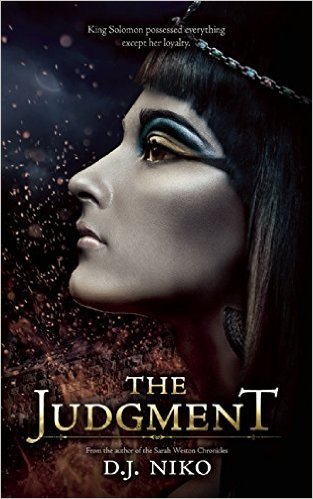 965 BCE
965 BCEUpon the death of his father, Solomon has been appointed king of the united monarchy of Israel and Judah and charged with building the Temple of the Lord in Jerusalem. He travels to Egypt to negotiate with Pharaoh Psusennes II for gold for the temple and to improve relations between the two nations. There he falls in love with the pharaoh’s beautiful daughter, Nicaule, and the two kings agree to an arranged marriage. Against her will, for she loves another, Nicaule follows her new husband to Israel.
Forty years later, Solomon’s empire is on the verge of collapse. Power has made him arrogant, permissive, and blind to the scheming of his wife and one of his lieutenants to topple the united monarchy. As the king’s faith falters and his people’s morals collapse, enemies gather at the gates of Israel. A visit from a mysterious queen restores Solomon’s perspective in time to save his soul—but it is too late to preserve his kingdom.
Someone who once was loyal to King Solomon has come back to claim the crown of Israel—and tear Solomon’s empire asunder. ***
 MY: Welcome to the blog! Could you tell us a little bit about your journey to becoming a published author.
MY: Welcome to the blog! Could you tell us a little bit about your journey to becoming a published author. DN: I’ve always been a writer, having started my career in journalism. As a journalist, I had travelled across the globe on assignment (and on personal adventures), so I used my experiences as a fiction platform. Also a lover of ancient history (I am Greek, after all), I combined the two passions to write historical thrillers. It was a bit of a rocky start, since I didn’t know what I was doing. But after many revisions and rejections, my first manuscript was bought by a wonderful publisher who then wanted to turn the stories into a series. That’s how The Sarah Weston Chronicles was born.
MY: What does your average ‘writing day’ look like?
DN: I’m afraid there’s no such thing as average in my house, since I have twin 7-year-olds and a great many demands. I try to rise early (4 a.m. most days!) and work while my house is quiet. But it doesn’t always work out.
MY: It sounds like you have your hands full! I have four children so I know what that is like!! Are there any authors that you particularly admire? And if so, why?
DN: I’m a big fan of Wilbur Smith. Partly because I’ve spent a great deal of time in Africa, where many of his novels are set, and can relate to his content. But he’s also an excellent storyteller.
MY: What are you currently working on?
DN: The fourth novel in The Sarah Weston Chronicles. It takes place in the American West and takes readers deep into Native American legend, mythology, and spirituality, while weaving in current-day issues such as land disputes and human rights. This new book (untitled as of yet) will also involve a young adult voice in addition to Sarah’s, which I hope will give readers a new perspective.
MY: If you could give advice to an aspiring author, what would it be?
DN: Write every day, improve your craft, and don’t give up too easily. Every rejection gets you closer to a “yes.”
MY: Authors are often portrayed as being cat owners who drinks a lot of coffee. Is this true for you?
DN: Well, I do have a cat (here she is). As for coffee, I pretty much think it’s a gift from the gods.

MY: She is so sweet!! What does ‘perfect’ day look like?
DN: Being somewhere quiet, preferably outdoors with a great view, with my laptop, uninterrupted for eight hours straight. There would have to be the opportunity for long walks in nature to clear my head, and, at the end of the day, a glass of good wine.
MY: Sounds perfect! What is your biggest vice?
DN: I’m a bit of a research junkie, so I sometimes overthink things. I often have to tell myself to just write, already!
MY: If you could meet anyone from the past, who would it be and why?
DN: This is kind of a tough one—so many possibilities! I’d probably want to meet one of the great British explorers, such as Mary Kingsley, to hear about the world’s great places before they were trampled by man.
MY: Where do you see yourself in five years?
DN: I can’t imagine it will be much different than it is today. Even with increased success, which hopefully will come in time, one must keep writing. MY: Last question…could you possible share an extract of The Judgement with us?
DN: It would be my pleasure.
Excerpt from THE JUDGMENT (released May 2016)
Night came swiftly to the valley of Jezreel. Basemath sat on a worn carpet on the ground of her prison-tent, knees gathered to her chest. Even in spring, the night’s breath was frigid as it blew across the open valley. A chill traveled down her spine, as much a response to the cold as to the fate that awaited her.
Though it would have offered her comfort, she refused the blanket that had been placed in the tent for her use. She recognized the coarse weave of the wool, striped in faded blue and violet and fringed on the ends, as the work of her people. She wondered which house Shoshenq’s men had pillaged and from whose bed they had plucked it. She imagined the inhabitants, ordinary folk judging by the quality of their textiles, being driven from their house, if they survived at all, scattering from their towns like ants, frightened and stripped of everything. She viewed the stolen blanket as a symbol of their suffering and left it be, for accepting it would feel like a betrayal.
She was grateful for this: her bindings had been cut. She pushed the long trumpet sleeve of her gown back and regarded the bloodied skin of her wrists, scraped raw by the jute. It stung no more than the humiliation of being taken prisoner.
The tent of her captivity was barely big enough for four people to stand upright, shoulder to shoulder. It was made of woven goat hair strips that had been stitched together to make a broad cloth and secured to the ground with wooden pegs. A branch of olive wood held up the ceiling. A meager flame burning in a clay saucer lamp flickered against the tent walls, casting long shadows in the semidark.
Basemath heard a man clear his throat outside her tent and realized she was being guarded. Her face tightened. This was a foil to her plan to exit the tent in the thick of night and search for her daughter. Even if it cost her life, she was determined to save Ana’s. The thought of her precious child in that heathen’s hands ignited a fury she did not recognize in herself. Anger and violence were not her way. But if it came to that, she would disembowel the Egyptian before seeing him strip the girl of her purity.
She inhaled deeply to let the rage simmer down. She needed her wits about her. She stood and walked to the flap covering the tent door. She peered through a slit and gazed at the sky. The full moon hung low above the horizon; she was facing east. She parted the fabric ever so slightly, hoping her movements would go undetected.
It was a fool’s hope. The guard noticed right away and pointed his spear at her, barking something in a dialect she did not recognize. He was a tall man of great girth, whose eyes shone with a murderous glint.
She did not retreat. “My thirst is great. I want a cup of water.”
He jabbed the air with his spear, urging her back inside.
She stood her ground, staring into his eyes, two obsidian marbles that seemed devoid of intelligence. “Bring me water.”
The tip of his spear touched her ribs. He spat out more words. When again she did not move, he twisted the spear.
She heard the linen of her gown rip and felt a sting. She glanced down and saw blood seeping slowly from the flesh wound. “You are godless,” she hissed in Hebrew.
“He is merely carrying out orders.” A male voice came from the shadows.
Basemath was surprised to hear Hebrew spoken in the enemy camp. She watched the guard’s reaction to the invisible intruder. He didn’t flinch.
“Who are you?” she asked, uneasy. “Show your face.”
He stepped into view. In the blackness of night, she could make out the lines of his halug, the long tunic that identified him as an Israelite. The decorations on the garment—a metal belt cinching the waist and embroidered trim along the sleeves, hem, and neckline—betrayed his status. She could barely see his face.
“Hello, Princess.” He edged forward. “It has been long years since we last met.”
Basemath froze when she realized who stood before her. There had been rumblings about the traitor’s return to Israel after he had been driven out of the country for masterminding a rebellion against her father. She attempted to speak, but the words were trapped in the cage of shock.
“Aren’t you going to greet your future king?
Where can I purchase The Judgment?Amazon
Where can I purchase The Sarah Weston Chroincles series?Amazon
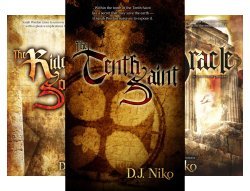
About the author
D. J. Niko is the pseudonym for Daphne Nikolopoulos, an award-winning journalist, author, editor, and lecturer who has spent her entire adult life traveling the world. As a former travel writer and zealous adventurer, she has visited remote spots on six continents, many of which have inspired her archaeological thriller series, The Sarah Weston Chronicles, as well as her historical novel, The Judgment. She was born and raised in Athens, Greece, and now resides in Florida with her family.Useful Links Twitter handle: @djnikobooks Facebook page: D.J. NikoWebsite: www.djnikobooks.com
Published on June 10, 2016 00:00
June 8, 2016
Author’s Inspiration ~ Laura Libricz @LauraLibricz
It with great pleasure that I welcome historical fiction author, Laura Librica, back onto the blog to tell us about her inspirations behind her latest work. But first, lets take a quick look at Laura’s latest book... The Master and the Maid She’s lost her work, her home and her freedom. Now, harboring a mysterious newborn, she could lose her life.

In 17th Century Germany on the brink of the Thirty Years War, 24-year-old Katarina is traded to the patrician Sebald Tucher by her fiancé Willi Prutt in order to pay his debts. En route to her forced relocation to the Tucher country estate, Katarina is met by a crazed archer, Hans-Wolfgang, carrying a baby under his cloak. He tells her an incredible story of how his beloved was executed by a Jesuit priest for witchcraft right after the birth and makes Katarina—at sword point—swear on her life to protect the child. But protecting the child puts Katarina at risk. She could fall in disfavor with her master. She could be hunted by the zealots who killed his beloved. She could be executed for witchcraft herself. Can Katarina's love for the baby and Sebald Tucher's desire for her keep the wrath of the zealots at bay?
Set in Franconia, The Master and the Maid is an accurate, authentic account of a young woman's life in Germany in the 1600's, her struggle for freedom and her fight for those she loves.
The Master and the Maid, the first novel in the Heaven’s Pond trilogy. ***
Inspiration behind The Master and the Maid“Listen to me! You see this child? If they find the child they will kill her. If they find me with this child, they will kill me to. They’ve already killed her mother. Sybilla saw them do it. But they won’t kill you. I’ll see to it. But you must swear to care for the child as your own. Never tell a soul where she came from or I will slit your throat.”
What started as a casual inquiry into the German psyche turned into my full-blown investigation into a tragic yet fascinating period of German history: the Thirty Years War. And what started as a fairy tale short story turned into 300,000 word trilogy. My fascination began while traveling in Germany and taking part in any city or castle tour. I heard over and over how this or that historical landmark was burnt to the ground and rebuilt after this devastating war that took place 400 years ago. Many sections of Germany were destroyed and depopulated and this affected generations to come. As an American ex-pate who has now spent close to half my life in this beautiful country, I felt the need to further my understanding of certain traditions and practices native to the Franconian area I live in and the early modern period was the place to start.
I took my first German class in college, over 25 years ago, and although I wanted to study something useful, I found myself spending more time with German literature and history than in the computer room. I was drawn to the dark stories of the Steppenwolf, The Weavers and the Hörspiele, radio plays, like The Man Outside. At that time I had a brother who had been in the military and lived in the federal state known as Franconia and still does today. When I graduated, I could read and write the language proficiently but speaking was just not my strong point. The next step was naturally to immerse myself in the language and the culture, buy a one-way ticket and spend some time abroad.
A three-month stay turned into three years and I had established myself with home, hearth, husband and children. Three years became thirteen became almost twenty. Still the Franconian people remained a mystery to me and I will always be a Paradiesvogelto them: Ami, loud, polite, talkative, energetic, inquisitive, at times inappropriate. I dealt with the feelings of isolation the way I deal with most of my feelings: by writing about them.
I also spent a lot of time in the Edelgraben, a tract of land behind the village I lived in. A mysterious hollow with farm fields full of healing herbs, carp ponds and mossy forests. There lies the forgotten hamlet of Sichardtshof, once a sheep farm. All that is left today is the well and a plan of how the buildings stood. Thanks to local historians, the information of what befell these Franconian villages during the brutal years between 1618 and 1648, the official years of the Thirty Years War, is extensive and easily accessible.
The Heaven’s Pondstory began with the fairy tale I wrote that became the story of Isabeau, the baby in The Master and the Maid. The story is incorporated in that novel as well. That, the setting of Sichardtshof (here’s a short video about that: https://youtu.be/3HMDPVl0XLg) and the fate of Isabeau’s guardian, the Maid, turned my life around. I say that with the risk of being overly dramatic but I am doing what I truly want to be doing. Studying history. Studying life. Writing.
Where can I purchase this fabulous book?Amazon USAmazon UK
About the author
 Laura Libricz was born and raised in Bethlehem PA and moved to Upstate New York when she was 22. After working a few years building Steinberger guitars, she received a scholarship to go to college. She tried to 'do the right thing' and study something useful, but spent all her time reading German literature.
Laura Libricz was born and raised in Bethlehem PA and moved to Upstate New York when she was 22. After working a few years building Steinberger guitars, she received a scholarship to go to college. She tried to 'do the right thing' and study something useful, but spent all her time reading German literature. She earned a BA in German at The College of New Paltz, NY in 1991 and moved to Germany, where she resides today. When she isn't writing she can be found sifting through city archives, picking through castle ruins or aiding the steady flood of Höfner musical instruments into the world market.
Her first novel, The Master and the Maid, is the first book of the Heaven's Pond Trilogy. The Soldier's Return and Ash and Rubble are the second and third books in the series.Useful LinksWebsite
Published on June 08, 2016 00:00
June 7, 2016
Chrétien de Troyes ~ Yvain, the Knight of the Lion

As I have said many times before, Arthur is not just an English story. He belongs to Wales, Scotland, and Brittany as well.
The French poet, Chrétien de Troyes, tells a very fascinating story in his epic poem, Yvain, the Knight of the Lion. If you would like to read a translation of this poem then you can do so here.
The poem starts in Wales and travels to Brittany. It follows the fortunes, and misfortunes, of Yvain – as per normal, he is a noble knight. There's a beautiful lady who he instantly falls in love with.
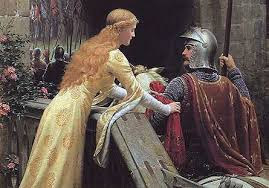
He forgets his promise to the said lady while he goes and seeks his glory. He is then driven mad by remorse when she want's nothing more to do with him.
"The king might take his body with him but there was no way he could have the heart, because it clung so tightly to the heart of her who remained behind that he had no power to take it with him. Once the body is without the heart, it cannot possibly stay alive, and no man had ever before seen a body live on without its heart.”
And then there's that whole business with the lion.
Yvain, the Knight of the Lion, has all the usual magic and adventure associated with Arthurian tales. It is full of noble deeds and wise words. This is one of my favourite quotes…
“The dungheap will always smell, wasps will always sting and hornets buzz, and a cad will always slander and vex others…”
Can you hazard a guess as to which Knight of the Round Table, Calogrenant, Yvain’s cousin, is referring too?
Yes, you guessed it. Sir Kay! The poor Knight, he really takes a hammering in de Troyes work! He is a thoroughly unpleasant chap, but Yvain does not respond with his fist...
"…Indeed, my lady, I don’t pay any heed to his insults. My lord Kay is so clever and able and worthy in all courts that he will never be deaf or dumb. He knows how to answer insults with wisdom and courtesy, and has never done otherwise. But I have no wish to quarrel or start something foolish; because it isn’t the man who delivers the first blow who starts the fight, but he who strikes back..."
But, in a world where honour is everything, Yvain's words seem a little bit well - what's the word - philosophical?
“ ...A man who insults his friend would gladly quarrel with a stranger. I don’t want to behave like the mastiff who bristles and snarls when another dog shows its teeth…”
But Yvain's bravery in unquestionable. He did rescue a lion from the mouth of a dragon, after all. The Lion shows his gratitude to Yvain by..
“...it stood up upon its hind paws, bowed its head, joined its forepaws and extended them towards Yvain, in an act of total submission. Then it knelt down and its whole face was bathed in tears of humility...”

Yvain and the Lion come to each others aid several times. The Lion is used as a metaphor - if you look after nature then nature will look after you. Isn't it amazing to think that there were people, all those years ago, who were interested in protecting the environment ~ being "green" is not such a new thing as we first thought.
“(the lion) is mine, and I am his…”
It sounds like a scene from Outlander!
De Troye certainly has a lot to say. He goes on to describe the injustice of the world.
…We stay awake much of the night and all day long to earn his profit, for he has threatened us with torture if we rest…”
He goes on to talk about the 'rights' of women. Rights might be to strong a word, but they are certainly very influential.
I do find this all rather fascinating. Maybe the past , as L. P. Hartley once said, isn't such a foreign place after all.
Do check out the story, I think it will surprise you!
Published on June 07, 2016 00:00
June 6, 2016
Book Review ~ The Shadow of a King @cgray129
Legends of old can never fade.
The truth can never die.
The tip of a spear settles any dispute.
But the love of a King comes before all.
In his fifteenth year of rule, King Uther Pendragon - High King of all the Celtic Tribes - is set on a quest by Merlyn and the druids of Mona, to brave the winter seas and set sail for the Isle of Erin. The quest placed upon the king, despite the tribal lands being at war with Saxon invaders, is to take a war party and return with a prize that will lay to rest the ghosts of the past and allow the Celts to reclaim their lands.
But none of those who set sail realize what this quest will release within their king, and what events will unfold.
The second book in C.M. Gray's Shadowland series, The Shadow of a Kingis a standalone fantasy adventure and can be enjoyed even if you haven't read the first book in the series.
***
"They had thought they were in the depths of winter, until the night when it really arrived."
What did I think of the book?
There is a border between this world and the Shadowlands. At one point everyone will cross into this ghostly realm. No man or druid can halt the natural way of things. King Uther Pendragon is dying, and the Saxons are coming. The future of Britain is uncertain.
Uther is in the care of the Abbess Morgana, at Glastening Abbey. The Abbey is a place of sanctuary, where a dying man may be given every possible comfort and attention. But the Abbess, although she appears godly, has a dark heart. She wants answers, and Uther will give them to her before he dies...one way or another.
C.M. Gray has brought back to life Uther Pendragon in this most evocative and beautiful story, set in the backdrop of the brutalities of 5th Century, Britain. This is the story before King Arthur, and it is a fascinating and spellbinding read. From the magic of the druids to the spender of the world that it is set in, I was enchanted.
The influence of Gildas, Bede, Nennius and not forgetting, Geoffrey of Monmouth, rings throughout this book as loud as any bell. Gray has given new life to a very old tale, and he has done it to an incredibly high standard, and I commend him for that.
I found myself completely immersed into the world Gray has created. I could almost smell the stench of battle, and I really took to Uther. He was an incredibly well crafted and believable character.
I adored Merlyn in all his eccentricity, and I loved the way he and Uther played off each other - It was just how I imagine the two of them would be. One thing was for certain - when Merlyn was around anything could happen, and it usually did! This kept me engaged as I wondered what this old druid was going to get up to next!
Morgana was the perfect antagonist – but she had a very compelling backstory, and I could understand – if not agree – with why she did what she did. Loneliness and abandonment turned to bitterness. And bitterness makes for a very unhappy life. As much as I wanted to dislike her, I could not, she had my sympathy.
I have no hesitation in recommending this book. It is a fantastic introduction to anyone interested in Arthurian legends, and it is on my repeat-to-read list.
I Highly Recommend.
“Merlyn, you are exasperating,I could have been killed.” Where can I buy this fabulous book?Amazon USAmazon UK About the author
 Born in Essex, England with a heavy dose of 'travel lust', C.M.Gray has since been lucky enough to live and travel in many countries around the world. In fact he has lived for more years outside of England than he has living there! Working as a carpenter, fruit picker and even a stint in stock brokering, he has called home Buddhist monasteries in the Himalayan Mountains, the clamor of central Hong Kong to a farm in deep rural Burgundy. Forever vowing to return and sink his roots once again in English soil... some day, he hasn't quite made it back yet, but does live a little closer these days; just outside of Barcelona in the middle of the forest with his dogs and two wonderful children.
Born in Essex, England with a heavy dose of 'travel lust', C.M.Gray has since been lucky enough to live and travel in many countries around the world. In fact he has lived for more years outside of England than he has living there! Working as a carpenter, fruit picker and even a stint in stock brokering, he has called home Buddhist monasteries in the Himalayan Mountains, the clamor of central Hong Kong to a farm in deep rural Burgundy. Forever vowing to return and sink his roots once again in English soil... some day, he hasn't quite made it back yet, but does live a little closer these days; just outside of Barcelona in the middle of the forest with his dogs and two wonderful children.
Published on June 06, 2016 00:00
June 5, 2016
Facebook Party ~ The Pirates Are Coming! Let's celebrate @SecretRealmBook
Secret Realm Book Reviews & Services Presents
The Pirates are Coming!
Facebook Party
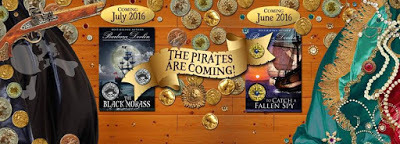
9th -10th July
I am happy to announce that I will be hosting a two day event for the talented author Barbara Devlin! We will be celebrating her two new novels coming out! BOOK ONE: To Catch A Fallen Spy releasing in June and The Black Morass releasing in July! Are you guys ready for one of the biggest events of the year??! I know I am! WE truly hope you can stop by, have some fun, enter a few giveaways, and celebrate with us.
9th July at 18:00 EST10th July 22.00 EST
Author Lineup for the 9th July
6-6:20pm EST- Emma Prince, Author
6:20-6:40pm EST- Tammy Andresen
6:40-7pm EST- Author Meara Platt
7-7:20pm EST- Hildie McQueen Author Page
7:20-7:40pm EST- Cynthia Wright
7:40-8pm EST- Regan Walker
8-8:20pm EST- Author Layna Pimentel
8:20-8:40pm EST- Linda Rae Sande - Author
8:40-9pm EST- Violetta Rand Romance
9-9:20pm EST- Amy Jarecki
9:20-9:40pm EST- Katherine Bone's Official Fan Page
9:40-10pm EST- Kathryn Le Veque, Author
Author Lineup for the 10th July
5-5:20pm EST-Cover Model Vikkas Bhardwaj
5:20-5:40pm EST- Eliza Knight
5:40-6pm EST- Victoria Zak Author
6-6:20pm EST- Suzanne Ferrell
6:20-6:40pm EST- Tarah Scott
6:40-7pm EST- Jeanne Adams
7-7:20pm EST- Collette Cameron
7:20-7:40pm EST- Amanda Mariel
7:40-8pm EST- Julie Johnstone
8-8:20pm EST- Christina McKnight
8:20-8:40pm EST- Tina De Salvo
8:40-9pm EST- Barbara Devlin's Nautionniers
Grab some Rum and I'll see you there!!
Hosted By:Secret Realm Book Reviews & Services www.thesecretrealm.com
The Pirates are Coming!
Facebook Party

9th -10th July
I am happy to announce that I will be hosting a two day event for the talented author Barbara Devlin! We will be celebrating her two new novels coming out! BOOK ONE: To Catch A Fallen Spy releasing in June and The Black Morass releasing in July! Are you guys ready for one of the biggest events of the year??! I know I am! WE truly hope you can stop by, have some fun, enter a few giveaways, and celebrate with us.
9th July at 18:00 EST10th July 22.00 EST
Author Lineup for the 9th July
6-6:20pm EST- Emma Prince, Author
6:20-6:40pm EST- Tammy Andresen
6:40-7pm EST- Author Meara Platt
7-7:20pm EST- Hildie McQueen Author Page
7:20-7:40pm EST- Cynthia Wright
7:40-8pm EST- Regan Walker
8-8:20pm EST- Author Layna Pimentel
8:20-8:40pm EST- Linda Rae Sande - Author
8:40-9pm EST- Violetta Rand Romance
9-9:20pm EST- Amy Jarecki
9:20-9:40pm EST- Katherine Bone's Official Fan Page
9:40-10pm EST- Kathryn Le Veque, Author
Author Lineup for the 10th July
5-5:20pm EST-Cover Model Vikkas Bhardwaj
5:20-5:40pm EST- Eliza Knight
5:40-6pm EST- Victoria Zak Author
6-6:20pm EST- Suzanne Ferrell
6:20-6:40pm EST- Tarah Scott
6:40-7pm EST- Jeanne Adams
7-7:20pm EST- Collette Cameron
7:20-7:40pm EST- Amanda Mariel
7:40-8pm EST- Julie Johnstone
8-8:20pm EST- Christina McKnight
8:20-8:40pm EST- Tina De Salvo
8:40-9pm EST- Barbara Devlin's Nautionniers
Grab some Rum and I'll see you there!!
Hosted By:Secret Realm Book Reviews & Services www.thesecretrealm.com
Published on June 05, 2016 00:49
June 3, 2016
Guest Post - Have you ever missed a place you have never been? @Mtmagee1013M
Historical fantasy author, M.T. Magee takes us on a journey to the Highlands and the Emerald Isle...
Before, I hand over the blog, let's first set the mood and nothing does that better than music!
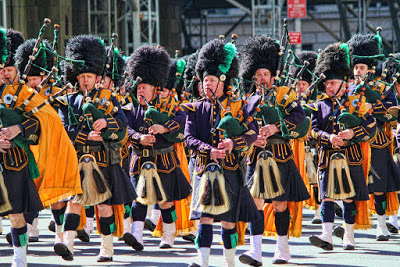
1- hour Bagpipe Music (and Drumming)
Tsz Kin Mak
Hello, my name is M.T. Magee and I wanted to thank, the fabulous Mary Anne Yarde, for having me here, to share my inspiration for the background for my book, The Treasure of Gwenlais.
I would like to start off by asking, have you ever missed a place you have never been?

Have you ever looked at pictures and thought, I belong there?
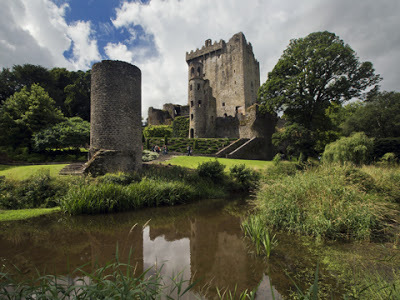
I have done this for some time, whenever I was researching places, names and history, of Scotland and Ireland. I did extensive research on towns and villages throughout Scotland and Ireland, in order to create a rich background for the mythical Kingdoms of Gwenlais and Heathwin.
 The world I have created, comes from the inspiration of both my Scottish heritage, my grandparents come from Scotland, and my husband’s Irish descent, with pride and respect for both cultures.
The world I have created, comes from the inspiration of both my Scottish heritage, my grandparents come from Scotland, and my husband’s Irish descent, with pride and respect for both cultures. The beauty of the Scottish Highlands, as well as the lush rolling meadows of Ireland, serve as a backdrop for the mythical realm of Rienfield. Many of the names of villages and towns that are used are actual names of towns and villages of Scotland and Ireland. They are used in direct correlation for what their rich past made them known for and is applied with loving respect for their history in the story. Many of the names of the characters are Irish, Scottish, or Gaelic, again showing my love and admiration for our heritages. The characters also speak Gaelic Irish, from time to time, referring to it as ‘old speak.’ I hope you will find this as fascinating and beautiful as I did. I respectfully envy the fact, that those of you who live in the UK and Ireland, are surrounded by such amazing history. My oldest son refers to your wonderful part of the world as, “the land of castles and knights”, yes I have taught him well.
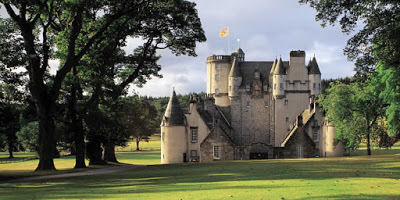
I was once asked in an interview, “why Scotland and Ireland?” Seriously? Have you read at all, about the amazing, romantic, brutal, history of it? How many wondrous legends, stories and poems still inspire even today?

The beautiful Gaelic languages are enthralling to say the least. I remember as a young girl of twelve, my Tolkien books in one hand and my history books in another. Trying to look up all the amazing places, that inspired one of my favorite authors and imagining I was there. When I would visit my grandparents, they were always listening to or playing traditional music. They loved anything with the fiddle, accordion, and especially loved bagpipes. I listen to it every day myself, before I start writing. One of my favorite aspects I enjoyed researching was the structure of families among the Scottish Clans. My grandfather’s family comes from the Fergus Clan, and I have to admit I felt a twinge of pride looking up the history, and knowing I belong to it in a small way.

Family structure, I read was important and vital to the Clans strength and growth, and I enjoyed highlighting the importance of this in my book. How it truly did take a village at times to raise children, as older cousins were often called upon, to help raise their younger cousins and teach them about the family history and heritage. So many fascinating historical aspects, in the small towns and villages throughout Scotland and Ireland.

The cider making history, the weaving and sheep farming, even the tiny towns known for growing the best cabbage, all were wonderful and endearing aspects, I could not help but be enchanted by. I truly look upon your wonderful countries, as the home I have yet to return to. I hope that someday I will, as it will always be in my heart, and my most inspiring muses to my work now and which is to come. So with that I say, dea-la mo chairde! I look forward to coming home, to land of castles and knights.
⚔
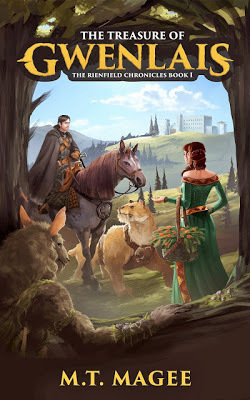 About the author
About the authorMy name is M.T.Magee and I am the proud Silver Medal recipient of the Drunken Druid Award based in Ireland. I write bestselling YA Historical Medieval Fantasy that is beautifully romantic with whispers of Gaelic legend.
I live in New England on our small farm with my husband and son. We raise an assortment of silly goats, quiet rabbits, far too many ducks and chickens, and a high strung Border Collie cross named Gronk. I have always loved fantasy and fell in love with Tolkien at age eleven. I read all of his works at age twelve. I have been writing stories since I was ten years old and have always wanted to be an author. After fulfilling my dream of becoming a nurse, marrying the love of my life and having two wonderful sons, I have finally been able to fulfill my first dream of publishing my first book. My youngest son is severely disabled and I am his full-time caregiver. The long winter months here in New England make it virtually impossible to go out very often, so I used this time to begin my story The Treasure of Gwenlais. Fifteen months and 1144 pages later I am very happy to present my story to all of you. I love strong female characters, who are still able to convey a sense of vulnerability and be very relateable. I also love strong male leads who are not afraid to show their soft side. Love of family is important to me as I am sure it is to everyone and I convey this in my story.
So welcome to the world I have created and I hope you enjoy visiting often. I hope you all enjoy the brilliant work of my cover artist Tyler Donnelly.
Purchase Links
Amazon US Amazon UK
Published on June 03, 2016 03:19
The Coffee Pot Book Club
The Coffee Pot Book Club (formally Myths, Legends, Books, and Coffee Pots) was founded in 2015. Our goal was to create a platform that would help Historical Fiction, Historical Romance and Historical
The Coffee Pot Book Club (formally Myths, Legends, Books, and Coffee Pots) was founded in 2015. Our goal was to create a platform that would help Historical Fiction, Historical Romance and Historical Fantasy authors promote their books and find that sometimes elusive audience. The Coffee Pot Book Club soon became the place for readers to meet new authors (both traditionally published and independently) and discover their fabulous books.
...more
...more
- Mary Anne Yarde's profile
- 159 followers



